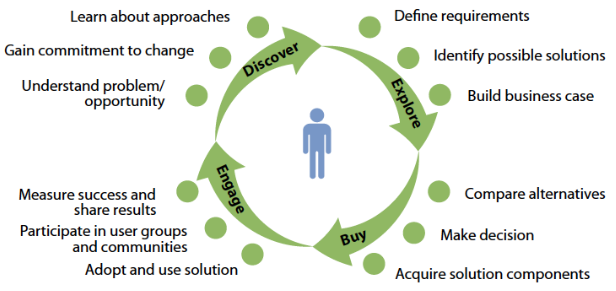B2B Marketers Have A Blind Spot: The Buyer Journey
Last month, I was immersed in face-to-face dialogue with senior B2B marketing leaders from well-known companies who were attending Forrester Forums and FLB events, and one thing was blatantly clear. These leaders are so focused on their initiatives, campaigns, and programs that they have lost sight of the thing that matters most: the customer.
 In one setting, I led a discussion group about big data. Rather than debate what big data really means and how it can be captured, I focused on how it could be used. I asked the members to think about the different touchpoints their firm has with customers at each stage of the customer life cycle and how the experience delivered at each of those touchpoints could be better informed by the new types of data that are available today. Most struggled with it, because they are not used to thinking about interactions from the customers’ perspective. Instead, they think of it as actions by their marketing and sales teams.
In one setting, I led a discussion group about big data. Rather than debate what big data really means and how it can be captured, I focused on how it could be used. I asked the members to think about the different touchpoints their firm has with customers at each stage of the customer life cycle and how the experience delivered at each of those touchpoints could be better informed by the new types of data that are available today. Most struggled with it, because they are not used to thinking about interactions from the customers’ perspective. Instead, they think of it as actions by their marketing and sales teams.
Next, I had the opportunity to sit down for two days of one-on-one meetings with senior marketing leaders who were attending Forrester’s Customer Experience Forum. Naturally, they were asking about the B2B customer experience, so I asked each one how their company goes about capturing information about how their customers buy. The answer was the same: We don’t have much of that information today.
I’ve written before about how B2B marketing is going through an essential transformation. Historically, our focus has been on events, PR, and collateral. Now, our CEOs and board are demanding that we’re directly driving revenue growth. This requires a whole new set of skills and activities across marketing and sales teams: content marketing, inbound marketing, lead-to-revenue management, revenue-cycle analytics, account-based marketing and selling, to name a few. At the core of any of these activities, and an absolute requirement of doing them well, is a deep understanding of your buyer journeys. Otherwise, you’re shooting in the dark.
You need to recognize that the B2B buying process is not one big decision; it is a series of micro-decisions. And the company that wins the business is the company that is there to answer those questions and provide fresh insights that influence how the buyers think about the problem so that the buyers can confidently advance their journey.
Take, for example, the very early stages of your customers’ problem-solving cycle, when they first realize they have a problem. They aren’t in a buying cycle yet. Instead, they are trying to understand their problem; determine how high a priority it is to fix, compared with everything else going on; who in the organization has to be brought in to change the status quo; how other companies have solved this problem; and if it's worth solving at this time.
How well do you know what questions your customers are asking at this stage? What insights are they seeking? What state of turmoil are they in? Where are they going to get information? What motivates them to move to the next step? If you’re not confident that you have the answers, you’ve got a blind spot.